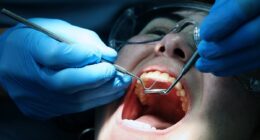Men could be screened for prostate cancer at home using a simple saliva test following a landmark trial set to ‘turn the tide’ on the disease.
The cheap test – which looks for genetic markers of the cancer in people’s DNA – was more effective than the current blood test men can request from their GP.
It picked up more aggressive cancers and resulted in fewer false positives, sparing men from unnecessary and expensive further tests.
Costing less than £200, experts said it could be sent in the post to those with symptoms or as part of a national screening programme, saving thousands of lives a year.
Researchers at The Institute of Cancer Research (ICR), London, and The Royal Marsden NHS Foundation Trust trialled the test on 6,142 men, aged 55-69, from their GP surgeries.

The cheap saliva test – which looks for genetic markers of prostate cancer in people’s DNA – was more effective than the current blood test men can request from their GP

They gave a sample of saliva which was then tested for 130 genetic variations in the DNA code with known links to prostate cancer, known as a polygenetic risk score.
The men scoring in the highest 10 per cent were invited for further screening, consisting of MRI followed by prostate biopsy.
Some 558 men were sent for further testing, with 40 per cent (187) diagnosed with prostate cancer.
This compares with 25 per cent of men with high prostate specific antigen (PSA) scores, who typically go on to be diagnosed with the disease.
PSA tests have also been found to pick up many cancers which are not of clinical concern and do not require treatment.
Crucially, this latest test identified a higher proportion of aggressive cancers – which are fast growing and likely to spread – than the PSA test.
Of the 187 cancers detected, 55.1 per cent were aggressive cancers compared with 35.5 per cent identified by a PSA test.
Ros Eeles, Professor of oncogenetics at The Institute of Cancer Research, London, said the breakthrough could change practice for the disease which kills 12,000 Brits every year.
Presenting the findings today at the American Society of Clinical Oncology (ASCO) annual meeting in Chicago, she said: ‘With this test, it could be possible to turn the tide on prostate cancer.
‘We have shown that a simple, cheap, spit test to identify men at higher risk due to their genetic makeup is an effective tool to catch the cancer early.
‘Building on decades of research into the genetic markers of prostate cancer, our study shows that the theory does work in practice – we can identify men at risk of aggressive cancers who need further tests and spare the men who are at lower risk from unnecessary treatments.’
The test will form part of the landmark prostate cancer screening trial underway in the UK, with a national screening programme almost certain to follow.
Transform will test the effectiveness of diagnosis techniques such as this saliva test, against the current PSA test over the next three years.
Retired lecturer Dheeresh Turnbull, from Brighton, was diagnosed with prostate cancer as a result of the BARCODE 1 study.
The 71-year-old was referred by his GP to take part in the trial, with the test finding his genetic risk was high.
Further tests confirmed he had prostate cancer and he was referred to The Royal Marsden in London, where he underwent robotic surgery to remove part of his prostate.
This led to his younger brother Joel to sign up for the trial, who was also diagnosed with the disease.
He said: ‘I was completely shocked when I received my diagnosis as I had absolutely no symptoms at all, so I know I would never have been diagnosed at this stage if I hadn’t joined the trial.

More than 52,000 men are diagnosed with prostate cancer every year on average in the UK, making it the most common cancer in men. Around 12,000 men die every year from the disease – the equivalent of one every 45 minutes
‘Because the saliva test revealed that I had a high genetic risk of developing the disease, my younger brother, who would have been too young to join the study directly, signed up and discovered that he also had an aggressive tumour in the prostate.
‘It’s incredible to think that because of this study two lives have now been saved in my family.’
Men who were found to have a high polygenic risk score during this trial will be followed to monitor if they go on to develop prostate cancer.
The technique will also be widened out to include new markers, recently identified for different ethnicities.
Professor Eeles added: ‘Our next step will be for us to test the genetic markers we have identified that are associated with a risk of prostate cancer in diverse populations, to ensure this test can benefit all men.’
There are around 52,000 cases of prostate cancer diagnosed across the UK every year – the equivalent of 142 every day – making it the most common cancer among men.
While survival rates have tripled in the past 50 years, projections indicate that by 2040 the number of men diagnosed every year in the UK could double.
Professor Kristian Helin, Chief Executive of the ICR, said: ‘Cancers that are picked up early are much more likely to be curable, and with prostate cancer cases set to double by 2040, we must have a programme in place to diagnose the disease early.
‘We know that the current PSA test can cause men to go through unnecessary treatments and, more worryingly, it’s missing men who do have cancer.
‘We urgently need an improved test to screen for the disease. This research is a promising step towards that goal, and it highlights the role that genetic testing can play in saving lives.’
The Daily Mail has campaigned for more than two decades for better diagnosis and treatment of prostate cancer.
Naser Turabi, Director of Evidence and Implementation at Cancer Research UK, said: ‘It’s encouraging to see that genetic testing might help to guide a more targeted approach to screening based on someone’s risk of developing prostate cancer.
‘More research is now needed to confirm if this tool can save lives from the disease so that it can be rolled out to improve diagnosis.’










